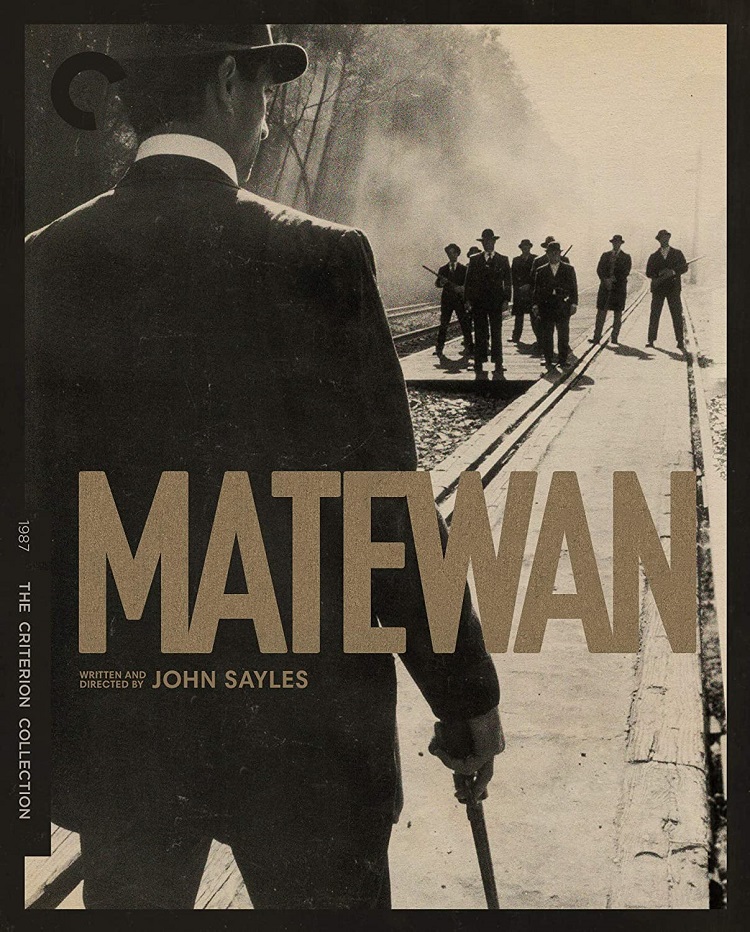
John Sayles’ Matewan is a dramatization of the Matewan massacre (1920), a battle that took place in the town of Matewan, West Virginia between coal mine workers and armed agents of the Baldwin-Felts Detective Agency on behalf of the Stone Mountain Coal Company. As told, it’s a compelling story from the workers’ point of view.
The Stone Mountain Coal Company is the main industry in town and with that monopoly, the company abuses its employees who suffer through brutal working conditions. The miners want to unionize, but the company ships in those even more desperate for work as replacements: African Americans and Italian emigrants. The job borders on indentured servitude, as deductions from their pay include items such as the train ride to Matewan, the cost of the tools, and use of a washroom. Their pay is in company scrip to be used at the company store. Anything purchased from another establishment that the company store has for sale results in firing without pay.
Joe Kenehan (Chris Cooper) comes to Matewan to help the miners organize. “Few Clothes” Johnson (James Earl Jones), a recent arrival to town and spokesman for the African Americans, wants to join the union. The miners are angry about him being a scab, but Joe points out that all the workers must set aside their prejudices and unite together against owners.
The company is against a union and Baldwin-Felts agents Hickey and Griggs (Kevin Tighe and Gordon Clapp respectively) are sent to stop it. They assume the civic leaders will be on the company’s side, but Mayor Cabell Testerman (Josh Mostel) and Police Chief Sid Hatfield (David Strathairn) relieve them of that notion. Unfortunately, matters escalate between the sides as the company agents attempt to crush the spirit of the workers and their families, leading to the Matewan massacre, which affects all involved.
It’s clear what side Sayles is on as his screenplay presents the workers and their families as realistic characters, which the cast brings them to life with authenticity. On the other hand, the villains are one-dimensional, bad because the story calls for it. The motivation for the agents and owners might have simply been greed and an indifference to their fellow man, but as an audience member, I wanted to understand why they did what they did from their perspective.
Aside from that imbalance, Sayles does a great job telling this story. The viewer is able to empathize with the different characters as they empathize with each other in scenes that reveal their shared humanity. It also helps to have a talented acting troupe saying the words and evoking the emotions. In addition, there are good plot twists, such as a company spy infiltrating the miners, and the narrator’s identity revealed at the end.
The liner notes reveal “Matewan is presented in its original aspect ratio of 1.85:1…This new digital transfer was created in 4K resolution on a Lasergraphics Director film scanner from the 35 mm original camera negative, preserved by Anarchists’ Convention Inc. and the UCLA Film & Television Archive. An archival 35 mm print manufactured by the UCLA Film & Television Archive under the supervision of cinematographer Haskell Wexler was used as a color reference. Thousands of instances of dirt, debris, scratches, splices and warps were manually removed using MTI Film’s DRS, whicle Digital Vision’s Phoenix was used for jitter, flicker, small dirt, grain, and noise management.”
The video is a mixed bag. Some scenes the colors look accurate, while others lean toward a green or yellow tint, so greenery looks particularly lush, but then faces may not have a natural skin tone. The tint contributes to crush in the shadows. Blacks are inky. Texture detail is strong as seen on the mine walls in low light. The sunlight blooms too bright through white curtains and on white clothing.
Also from the liner notes, “the original monaural soundtrack was restored by the UCLA Film & Television Archive from the 35 mm full-coat six-track magnetic master at Audio Mechanics in Burbank, California, under the supervision of Ross Lipman.” The dialogue is clear. The score and diegetic sound have good fidelity.
The director-approved special features are:
- Recorded in 2013, an engaging audio commentary between Sayles and Wexler, nominated for this work.
- The Making of Matewan: Union Dues (26 min) / Sacred Words (31 min) featuring Sayles, producer Maggie Renzi, production designer Nora Chavooshian, and actors Chris Cooper, James Earl Jones, Mary McDonnell, Will Oldham, and David Strathairn. Subjects about the film’s making include the way Sayles works and praise for Wexler.
- The Music of Matewan (19 min) – Composer Mason Daring on the film’s soundtrack
- Production Design (15 min) featuring Chavooshian
- Them That Work (28 min) – Jason Brown, a professor of media studies at Valdosta State University, made a short documentary about the impact the production of Matewan had on West Virginians.
- Trailer
John Sayles is a beloved independent filmmaker since his debut Return of the Secaucus 7 (1979), which made it a bit of a surprise to discover Matewan is his first entry in the Criterion Collection. Not sure the reasons it’s taken so long to rectify this situation, but Matewan is certainly a worthy title from his filmography in which to recognize him because it demonstrates his strengths as both a writer and director. Some many quibble with the video’s color, but I wasn’t distracted by it. The extras do a good job putting a spotlight on the film and its makers.